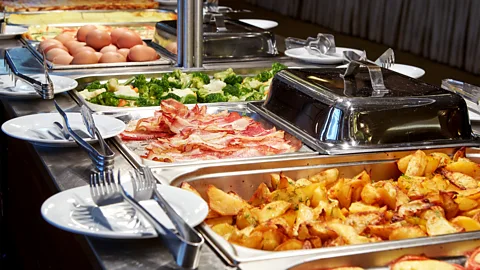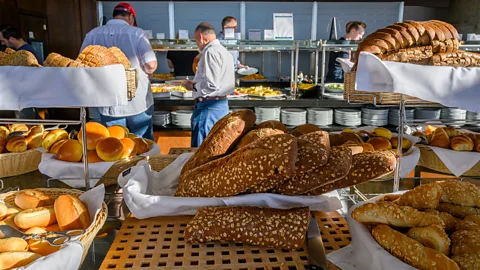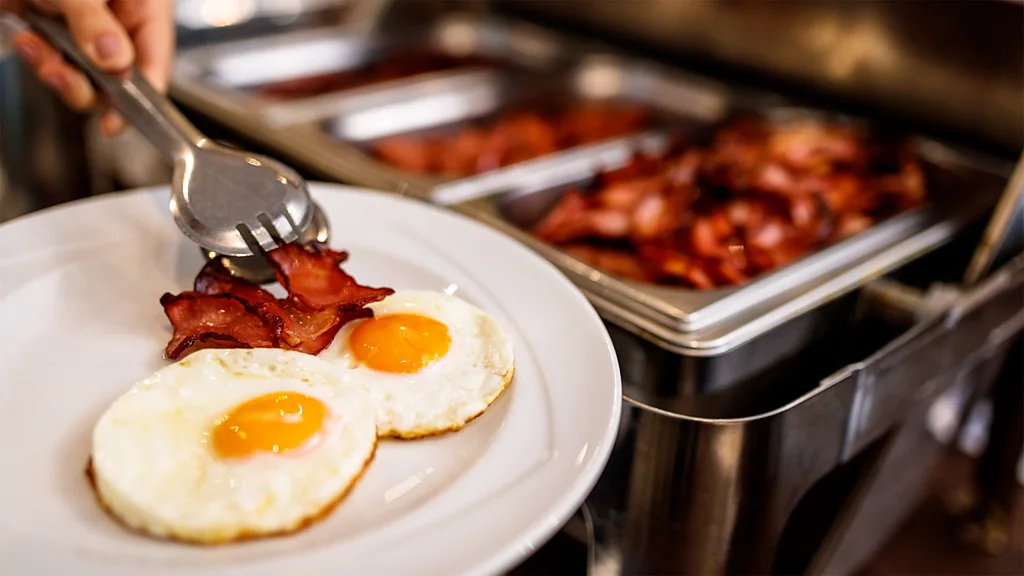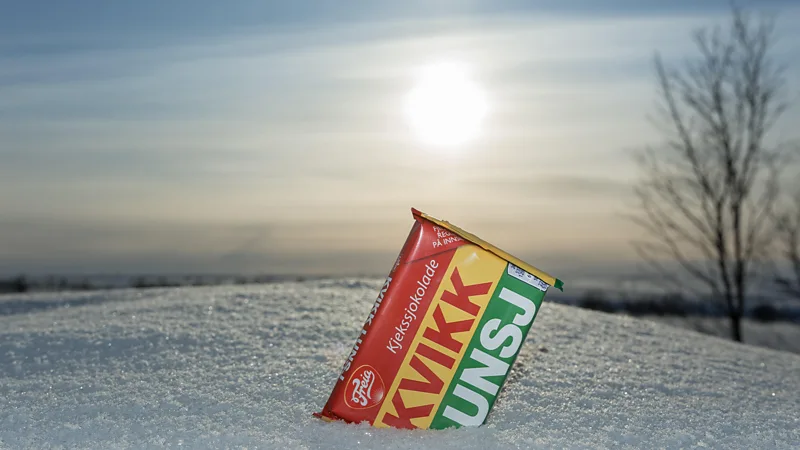![]()
Once a hallmark of hotel luxury, the breakfast buffet is under scrutiny for its waste, overconsumption and environmental impact.
Stacks of pancakes, pyramids of pastries and vats of scrambled eggs; endless rows of fruit, cold cuts and cheese. Breakfast buffets across the world promise abundance – and often deliver excess. But behind the allure lies a darker truth: food waste.
According to UNEP’s Food Waste Index Report 2024, 1.05 billion tonnes of food were wasted globally in 2024, with 28% coming from foodservice. Buffet breakfasts are among the worst offenders, generating more than twice as much waste as plated breakfasts – around 300g compared to 130g for made-to-order meals.
“Wasted food means wasted resources like land, water, energy and labour, and once in landfill, it emits greenhouse gases that harm the planet and biodiversity,” says Jocelyn Doyle, head of marketing & communications, The Sustainable Restaurant Association. “Cutting food waste is a powerful way to make a difference – and breakfast is a smart place to start.”
Hotels across the world are adopting subtle design choices to meet this goal. Scandic Hotels in Northern Europe are downsizing their cakes, pastries and muffins, with the option to come back for more. Ibis hotels, a French brand of budget hotels with a presence in 70 countries, uses smaller plates to limit excess; while Hilton Frankfurt serves pre-portioned items like yogurt and fruit cups. Novotel Bangkok Sukhumvit posts polite reminders near buffet stations: “Take only what you can eat.”
Award-winning Thai-American chef Pichaya “Pam” Soontornyanakij believes this is a timely conversation to have. “The all-you-can-eat breakfast buffet is a symbol of a certain era in hospitality, an era that celebrated abundance as luxury,” she says. But luxury has evolved. “It’s no longer about quantity or excess; it’s about thoughtfulness, quality, and care – not just for guests but also for the planet.”
According to Dr Kelly L Haws, an expert in consumer behaviour, buffets often lead to overeating due to the “variety effect” – more choice encourage greater consumption. “Self-serving also leads to oversized portions as people misjudge serving sizes,” she says, adding that the abundance of buffet-style breakfasts can lead consumers to “take more food, consume more food, and feel less guilty about wasting that food”.

The desire to get one’s money’s worth from a fixed-price buffet adds to the urge to overeat – and even those aware of climate issues may underestimate the impact of their own food waste. “Travel settings trigger a ‘vacation mindset’ where indulgence feels justified,” Haws says.
This is where small but strategic tweaks work come in as “nudges” that can help reduce waste without compromising guest satisfaction. Smaller plates and limited stacks of clean dishes can encourage guests to take less. Offering smaller quantities, along with signage about frequent refills, can discourage the “abundance effect” while ensuring freshness. Pre-portioned servings also help, though they require a balance with packaging waste. Simple, well-placed messaging can also prompt mindful choices. Other tweaks include positioning lighter options such as salad first, placing heavier, more filling foods later in the buffet line and setting up an “order-on-demand” station.
Thoughtful Travel
Want to travel better? Thoughtful Travel is a series on the ways people behave while away, from ethics to etiquette and more.
This shift works well for the modern traveller for whom sustainability is no longer a side note. According to a new Booking.com report, 84% of global travellers consider sustainability important, with many actively seeking ways to reduce their environmental footprint.
Frequent traveller Dhanashree Thosar agrees, saying that she now chooses to eschew the breakfast buffet. “Buffets always make you forget portion control, confuse you with too many choices and usually leave me feeling guilty,” she explained. At a recent stay at The Park in Bangalore, her breakfast was served in courses: fresh fruit, eggs with herbs from the garden and a just-baked cake to end. “It felt intentional, not excessive; mindful not overindulgent,” she says, adding that a hotel that truly cares about minimising wastage will always be a top choice as it has a “shared sense of purpose”.
Fewer options and less clutter can even enhance perceptions of quality, even within an all-you-can-eat setting. “These cues may reduce waste and consumption while boosting overall guest satisfaction, creating a positive halo effect for the hotel experience,” Haws says.
In a shift toward thoughtful indulgence, sustainable luxury brands have moved away from buffet spreads in favour of chef-crafted menus and bespoke morning experiences. These include offerings like chef’s market-to-table breakfasts at Six Senses; collaborations with a visiting pastry chefs, coffee roasters or tea masters at Anantara; and wellness-themed dawn rituals such as yoga or guided meditation before breakfast at Aman.

Hilton Worldwide, with nearly 6,000 properties in more than 100 countries, aims to reduce the amount of food waste it sends to landfills by 50% by 2030, a target aligned with the UN’s 2030 Sustainable Development Agenda. To do this, Hilton Tokyo Bay is tackling food waste with AI-powered kitchens; Conrad Centennial Singapore is using “ugly vegetables” that are typically thrown away; while Hilton Shenzhen Shekou Nanhai is using smart kitchen waste treatment equipment to turn kitchen waste into carbon dioxide, water and organic fertilisers. All Hilton hotels in the Philippines and Indonesia donate extra food to local food banks and soup kitchens.
While many travellers are leaning towards more intentional, waste-conscious dining, hotels still face the complex task of meeting diverse guest expectations. Striking the right balance between sustainability and service is no small feat, says Marjolein van Spronsen, marketing & communication manager at hospitality consultancy Van Spronsen & Partners – especially at breakfast, where the variety that guests expect often clashes with efforts to minimise excess.
She explained that many hotels now track how much food is thrown away to determine the buffet’s baseline needs. “Other trends include a buffet supplemented with a breakfast menu featuring special dishes (for a feeling of luxury when served at the table), and breakfast-to-go bars that offer light sustenance in the morning,” van Spronsen adds.
Doyle also suggests that hotels reconsider under-consumed items, install cook-to-order stations, reduce the selection of items on offer, reduce volumes towards the end of shift and actively guide guest behaviour. “Involve and educate your staff so they understand the changes and can confidently engage guests,” she says. “Share your efforts through website and social media updates, and use buffet signage to make guests feel part of the solution.”
Breakfast is the final part of the offering that they’ll experience before check-out – why not leave them with a feeling of being pampered – Jocelyn Doyle
Ultimately, however, Doyle recommends that hotels give serious consideration to removing the buffet altogether – and elevating their breakfast experience instead. “In addition to reducing waste, a small, thoughtfully planned, cooked-to-order breakfast menu can provide a more restful and luxurious experience for guests. Breakfast is the final part of the offering that they’ll experience before check-out — why not leave them with a feeling of being pampered?” she says.
Towering cereal dispensers, trays of sausages and mountains of bread may have once symbolised indulgence, but their time is waning. As luxury redefines itself around thoughtfulness and sustainability, made-to-order breakfasts offer a quieter, smarter indulgence.
Source: BBC News



